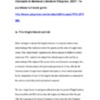Browse Items (22 total)
- Tags: Modern English literature
Sort by:
Anglo-Saxon in Middle earth (part 2)
This is the second part of the study pack created especially for anyone coming to Anglo-Saxon from an original interest in Tolkien's The Lord of the Rings. Like Part 1, it has been available on the Tolkien Society website and in hard copy since it…
Old English in Middle earth Study Pack
This study pack was designed especially for anyone coming to the Anglo-Saxon language from an initial interest in J.R.R. Tolkien's The Lord of the Rings. It is a short and very informal introduction to Anglo-Saxon, but for many people their first…
Not of stone (poem)
A poem inspired by the Anglo-Saxon church of St Andrew at Greensted in Essex, parts of which are estimated to be over a thousand years old; it is possible that the site has been a place of Christian worship for 1,300 years. St Andrew's is the oldest…
Tuesday Poem – “Wulf and Eadwacer”
This is a blog post by writer Joanna Preston discussing 'Wulf and Eadwacer' from a poet's perspective. The translation provided is a composite made up of translations found on the web. Please note that this is a zipped file: in order to read it,…
Gold -- a poem
I wrote this poem after queuing to see the Staffordshire Hoard.
Pre-print Extracts - Key Concepts in Medieval Literature
Pre-print extracts from E. Solopova and S. Lee's 'Key Concepts in Medieval Literature' (Palgrave/Macmillan, 2007) with illustrative essays on Old English and the Anglo-Saxons. Can be ordered (pb/hb) at:…
Heroic Ideal
A poem inspired by a reading of the Anglo-Saxon poem 'The Battle of Maldon'. This poem was first published in my 'New and Selected Poems' (Peterloo, 2005)
Borges on the Wall
Sometime in the early 1970s, the Argentinian writer Jorge Luis Borges visited his friend the poet (and later Borges' translator) Alistair Reid at St Andrews in Scotland. Various myths and legends have grown up around this visit in the oral tradition…
Song of The Ruthwell Cross
The Ruthwell Cross is an Anglo-Saxon (or more properly Northumbrian) stone sculpture, dating from the eighth (or perhaps seventh) century, and now housed in Ruthwell parish church in Dumfriesshire, although it may have once stood outside. Runic…
Translation of 'The Ruin'
This text is an adaptation from the Old English poem 'The Ruin', which is preserved in the tenth-century Codex known as The Exeter Book. The Old English 'Ruin' describes a fallen and decaying city, and has sometimes been seen as an Anglo-Saxon…


